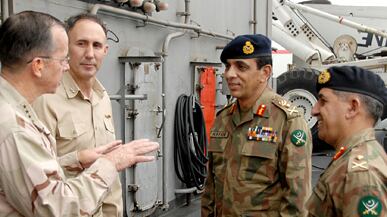Among the world's spy agencies, few have more secrets than Pakistan's Inter-Services Intelligence Directorate, or ISI, Washington's often unreliable ally in the war on terror. And within ISI, no secrets are more closely held than those of "S Wing," the notorious "black operations" unit that is reported to serve as Pakistan's liaison to the Taliban, Al Qaeda and the homegrown anti-India extremist group that carried out the 2008 terrorist siege of Mumbai, India's largest city; there is widespread suspicion in Pakistan that S Wing played a role in providing sanctuary there to Osama Bin Laden.
This week, however, the secrets of S Wing are threatening to spill out in a Chicago courtroom when jury selection begins in the trial of a Pakistani-born businessman accused of using his U.S. visa-processing company to provide logistical cover for the attacks in Mumbai, where 170 people were killed, including six Americans.

Law-enforcement and national-security officials tell The Daily Beast that the trial will offer the fullest public accounting—anywhere—of the deadly treachery of S Wing, which is believed to have had a key role in organizing the Mumbai attacks. (Within ISI, operations are divided into lettered sections, with S managing the spy agency's operations in neighboring Afghanistan and India.)
"I'm not sure you'll hear the prosecutors refer to S Wing by name, but that's the part of ISI that is tied into this case," said an American national-security official in Washington who requested anonymity discussing sensitive matters. "S Wing is the black-ops part of ISI. And nothing would have been more black ops for the ISI than" the Mumbai attacks, he said.
The official said it was widely assumed in Washington—though unproved—that if any element of ISI was responsible for providing sanctuary for Bin Laden during his years in Pakistan, "it had to have been S Wing at work."
If any element of ISI was responsible for providing sanctuary for Bin Laden during his years in Pakistan, says one U.S. national-security official, "it had to have been S Wing at work."
The ISI has denied any support for terrorist groups, Al Qaeda in particular, and has insisted that it had no knowledge of Bin Laden's presence—apparently, for years—in the city of Abbottabad, home to the military academy that is Pakistan's equivalent to West Point.
On Friday, Pakistan's spy chief, Lieut. Gen. Ahmed Shuja Pasha, lashed out at the United States, angrily denouncing the American raid that killed Bin Laden as a violation of Pakistan sovereignty. He acknowledged, however, that Bin Laden's ability to hide out in Pakistan represented an embarrassing intelligence failure for ISI.
The United States has expressed alarm for years over evidence of ties between ISI, which functions as Pakistan's equivalent of the CIA, and the Taliban and Al Qaeda. There has been special alarm in Washington over the operations of S Wing, which appears to exist as a power unto itself within ISI, maintaining close ties with militant groups that the Pakistani government otherwise purports to consider its enemies. S Wing is alleged by American officials to have been involved in arming the insurgents in Afghanistan who are at war with—and killing—American troops.
Marvin Weinbaum, a former State Department intelligence analyst on Pakistan, said that even after pumping billions of dollars into the Pakistani military and the ISI since the 9/11 attacks, Washington still knows remarkably little about the ISI's inner works—and even less about S Wing.
He said that S Wing oversees the ISI's most sensitive operations and that its leadership includes several military officers who go through the motions of retirement so they can serve in the shadowy unit.
"It's a retirement of convenience," said Weinbaum, now a scholar at the Middle East Institute, a Washington think tank. "They conveniently retire people for the purpose of association with the unit, so there's plausible deniability for the military with these operations. The Army can claim they had no part in them."
In the Chicago trial, the defendant, Tahawwur Rana, is accused of providing logistical support to the terrorist scouting operations of Lashkar-e-Taiba, the Pakistani group that mounted the attacks in Mumbai three years ago.
American officials say Lashkar is largely a creation of the ISI and has often been used as a proxy to mount attacks on India, which is still seen by the Pakistani military as their nation's existential threat. Although labeled a terrorist group by the United States, Lashkar has broad public support in Pakistan.
The star prosecution witness against Rana is expected to be a childhood friend, David Headley, a 50-year-old Pakistani-American who has already pleaded guilty to terrorism charges and confessed that he used Rana's visa-processing company as a front to travel to India and scout the Mumbai targets.
According to American officials, Headley will testify that he was recruited for the operation by an ISI officer associated with S Wing—identified in court papers as " Major Iqbal"—and that the officer served as his handler throughout.
The Justice Department announced last month that Major Iqbal, who remains at large, apparently in Pakistan, has also been indicted in the case. In what was seen by officials elsewhere in the U.S. government as an effort to avoid new damage to relations with Pakistan, the department did not identify Major Iqbal as an ISI officer, citing him in the indictment only as "a resident of Pakistan who participated in planning and funding attacks by Lashkar."
Philip Shenon is an investigative reporter based in Washington D.C. Almost all of his career was spent at The New York Times, where he was a reporter from 1981 until 2008. He is the bestselling author of The Commission: The Uncensored History of the 9/11 Investigation . He has reported from several warzones and was one of two reporters from The Times embedded with American ground troops during the invasion of Iraq in the 1991 Gulf War.






